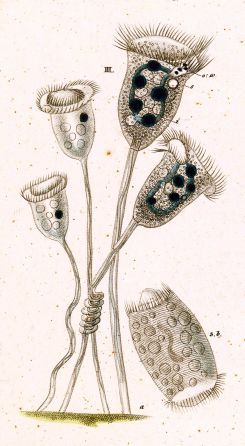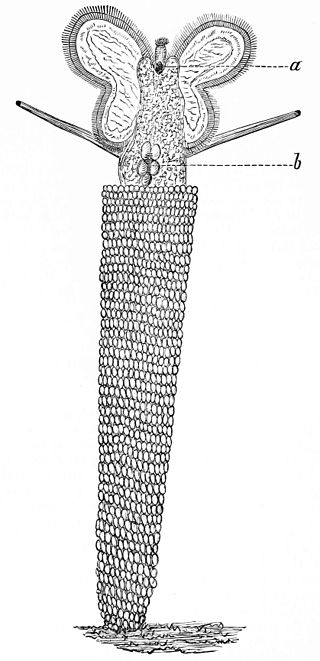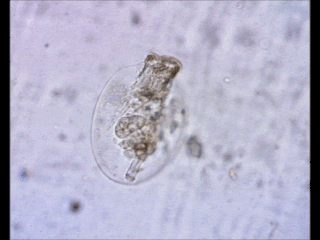
The rotifers, commonly called wheel animals or wheel animalcules, make up a phylum of microscopic and near-microscopic pseudocoelomate animals.

Blepharisma is a genus of unicellular ciliate protists found in fresh and salt water. The group includes about 40 accepted species, and many sub-varieties and strains. While species vary considerably in size and shape, most are easily identified by their red or pinkish color, which is caused by granules of the pigment blepharismin.

Vorticella is a genus of bell-shaped ciliates that have stalks to attach themselves to substrates. The stalks have contractile myonemes, allowing them to pull the cell body against substrates. The formation of the stalk happens after the free-swimming stage.

Brachionus is a genus of planktonic rotifers occurring in freshwater, alkaline and brackish water.

Brachionus calyciflorus is a planktonic rotifer species occurring in freshwater. It is commonly used as a model organism in toxicology, ecology and evolutionary biology.
Its advantages include the small size and short generation time.

Keratella cochlearis is a rotifer. The planktonic animal occurs worldwide in freshwater and marine habitats.

Dileptus is a genus of unicellular ciliates in the class Litostomatea. Species of Dileptus occur in fresh and salt water, as well as mosses and soils. Most are aggressive predators equipped with long, mobile proboscides lined with toxic extrusomes, with which they stun smaller organisms before consuming them. Thirteen species and subspecies of Dileptus are currently recognized.

Floscularia ringens is a species of rotifer belonging to the class Monogononta, which resides in a tube that it builds using many little circular pellets consisting of bacteria and small pieces of detritus.

Halteria, sometimes referred to as the jumping oligotrich, is a genus of common planktonic ciliates that are found in many freshwater environments. Halteria are easy to locate due to their abundance and distinctive behaviour with observations of Halteria potentially dating back to the 17th century and the discovery of microorganisms. Over time more has been established about their morphology and behavior, which has led to many changes in terms of classification.

Testudinella is a genus of rotifers belonging to the family Testudinellidae.
Notommata is a genus of rotifers belonging to the family Notommatidae.
Monommata is a genus of rotifers belonging to the family Notommatidae.

Lecane is a genus of rotifers belonging to the family Lecanidae. It is the only genus in the monotypic family Lecanidae and has a cosmopolitan distribution

Lepadella is a genus of rotifers belonging to the family Lepadellidae. The genus has a cosmopolitan distribution
Encentrum is a genus of rotifers belonging to the family Dicranophoridae.

Colurella is a genus of rotifers belonging to the family Lepadellidae. The genus has a cosmopolitan distribution
Dicranophorus is a genus of rotifers belonging to the family Dicranophoridae.

Dissotrocha is a genus of rotifers belonging to the family Philodinidae. The species of this genus are found in Europe, Australia and North America.

Euchlanidae is a family of rotifers belonging to the order Ploima.

Proales is a genus of rotifers belonging to the family Proalidae.















